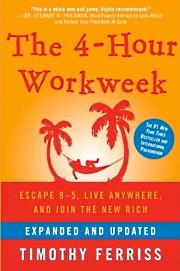By Tim Ferriss, no-holds-barred cage fighter, kick-boxer-pusher, and the author of the bestselling book The 4-Hour Workweek…
In 1999, sometime after quitting my second unfulfilling job and eating peanut-butter sandwiches for comfort, I won the gold medal at the Chinese Kickboxing National Championships.
It wasn’t because I was good at punching and kicking. God forbid. That seemed a bit dangerous, considering I did it on a dare and had four weeks of preparation. Besides, I have a watermelon head–it’s a big target.
I won by reading the rules and looking for loopholes, of which there were two:
1. Weigh-ins were the day prior to competition: Using dehydration techniques I now teach to elite powerlifters, I lost 28 pounds in 18 hours, weighed in at 165 pounds, and then hyperhydrated back to 193 pounds*. It’s hard to fight someone from three weight classes above you. Poor little guys.
2. There was a technicality in the fine print: If one combatant fell off the elevated platform three times in a single round, his opponent won by default. I decided to use this technicality as my single technique and just push people off. As you might imagine, this did not make the judges the happiest Chinese I’ve ever seen.
The result? I won all my matches by technical knock-out (TKO) and went home national champion, something 99% of those with 5-10 years of experience had been unable to do.
How to survive a physical attack
with Tim Ferriss and Dave Camarillo

It’d be nice if this post had your opinion on the subject. Obviously you disagree with Tim’s approach, but I was waiting for your take on the subject.
Ditto Dojo-Reviews. Does anyone else wish he’d come up with some kind of conclusive evidence as to that kickboxing title? Making that kind of claim reminds me of that one kid I knew in high school with a girlfriend in the next town over who nobody ever met.
I’m not saying you couldn’t win a kickboxing tournament like that. I just think it’d be nice if he at least gave the year and location of the tournament so interested parties could look into it.
Dojo-Reviews, in my opinion and for the purposes of this post: the right way to win a kickboxing tournament is by actually kickboxing, preferably within your own weight class.
Tim has said that “cutting weight is a prerequisite for elite competition in such sports—period.” Yet his account above implies that he was the only one doing it here.
Mike, Tim says he won the United States of America Wushu-Kungfu Federation (USAWKF) sanshou national championships in 1999.
I read the book too, (ok I only looked at the pictures and had my half wife read me the juicy bits but whatever) he could have called it “Doing Indolence Right.” Or, ” the art and science of being lazy.”
I expect there will be a whole generation of Hobo-nerds coming out of the woodwork one of these days.
Awesome. Thanks for the tip, Chris.
I used to be the coach of the National Sanshou team here in Belgium (the “Chinese kickboxing” Tim is talking about.) Cutting weight like that is done by some fighters and not by others. It depends on how your body reacts to the dehydration, not everybody who does it fights well the day after. I’ve seen it happen many times over.
That said, I consider it cheating within the rules. Yup, you’re allowed to do it. They can’t fault you for it. But it’s pretty poor sportsmanship to fight three weight classes below your actual weight. It’s not all that difficult then to win, there are reasons for those weight classes: size matters…
Personally, I wouldn’t be proud of it. I competed to test myself against other fighters who could give me a run for my money. If I was good enough, I won. If not, I lost. But I never went and picked on guys who were 30lbs lighter. That’s what bullies do…
Wim Demeere
Yeah he said that back when he competed no one really dehydrated like that so he had the advantage. He also mentions that today it’s pretty common.
Tim’s point in his book wasn’t to brag about winning. He made a point similar to Malcolm Gladwell in his book David and Goliath which describes the power of viewing things from an unconventional perspective. The major concept in his book is to do things differently in your work to be more effective in a few hours each week than in your current 40 to 50 hours each week. Why? So that you can live life now, rather than slaving away your life with the dream of enjoying real living after age 65, only to die early or not have the finances or health to enjoy it. Tim describes traveling the world in mini retirements. Experiencing places and activities to their fullest now.